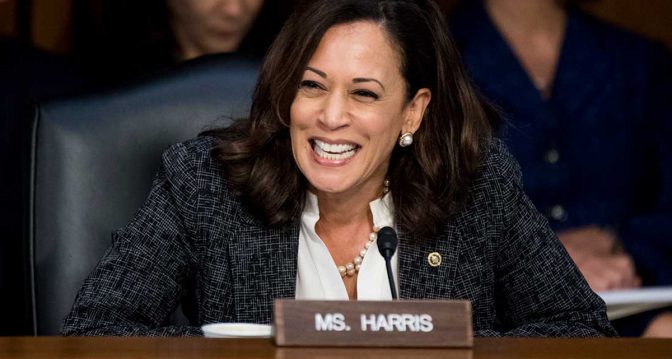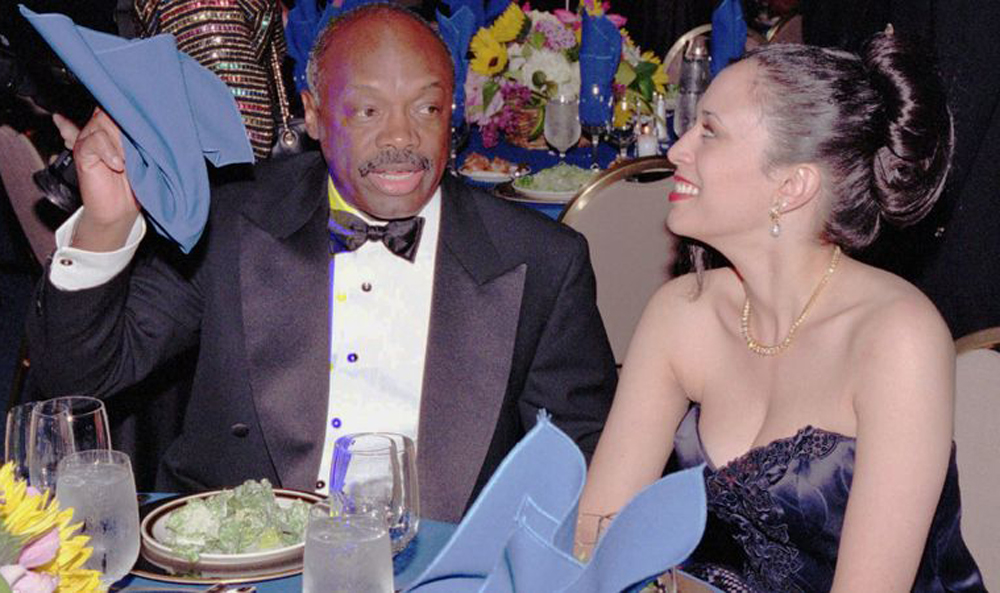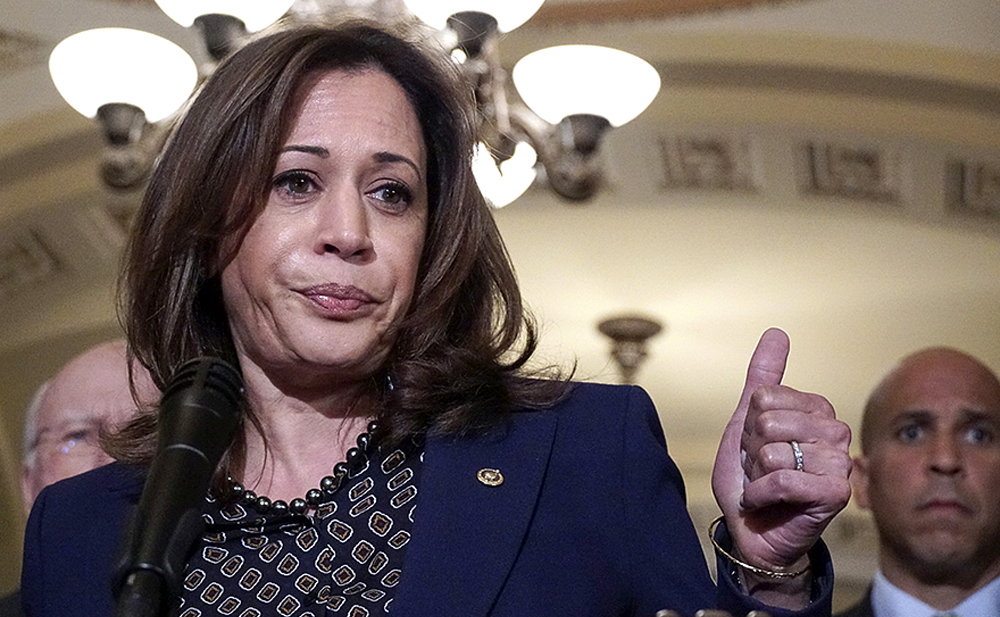Joy Inside My Tears: The Greening of Kamala Harris

During a February 11 appearance on New York City morning radio show, The Breakfast Club, Senator Kamala Harris admitted smoking marijuana in college and said that she supports its legalization.
Even these days, when a serving member of the U.S. Senate says something like that, it’s news. But Senator Harris’s announcement on January 21 that she’s running for the Democratic presidential nomination in the 2020 general election makes her statements all the more significant.
At the 34th minute of the interview (watch below), DJ Envy commented: “They say you opposed legalizing weed.”
“That’s not true,” Harris replied stiffly, then lightened up. “Half my family’s from Jamaica. Are you kidding me?”
Harris’ father Donald was born in Jamaica and came to the U.S. in 1961 to attend the University of California at Berkeley. Her mother, Shyamala, was from India.
Then she launched into a long caveat about pot: “I have had concerns. I believe we need to legalize marijuana and we need to move it on a schedule so we can research the impact weed has on a developing brain. That part of the brain that develops judgment actually begins its growth at ages 18 to 24.”
“The frontal cortex,” Envy offered.
“That’s exactly right,” Harris replied and continued: “We’ve got to take that seriously. I believe we need to research that because I don’t think we really know the consequences.
“The other issue that we’ve got to address is how are we going to measure impairment when somebody has been smoking weed, in terms of driving. You know, these are details that some people may not want to hear me talk about, but look, I started my work when Mothers Against Drunk Driving were active because so many young people were being killed because of people who were driving under the influence. So, it’s a real issue.”
Harris: “Half my family’s from Jamaica. Are you kidding me?”
Harris was a career prosecutor before she won the race for Barbara Boxer’s open Senate seat in California in 2016. Her resume includes stints as Attorney General of California (2011-2016) and District Attorney of San Francisco (2004-2010).
“This is my background and this is how I think about things and that’s just the fact,” she went on. “When somebody is driving a car, it can be a lethal weapon in the hands of somebody who’s impaired. So that needs to be addressed also. But I’m absolutely in favor of legalizing marijuana. We have incarcerated so many, particularly young men of color in a way that we have not put the same level of use by other young men.
“We’ve got to deal with that in addition to dealing with the fact that not all drugs are the same. I have forever been an advocate for medicinal marijuana. I have personally known people who only benefited from it. So, there are a lot of reasons why we need to legalize it.”
DJ Envy Pops the Big Question
Not to be deterred, Envy moved in for the kill: “Have you ever smoked?”
“I have,” she admitted without hesitation. “And I inhaled. I did inhale. It was a long time ago. I just broke news.” Harris laughed and cackled wildly throughout the answer.
“I like stuff like that,” Envy said. “It’s a real honest answer.”
“Blunt or joint?” Envy’s partner Charlemagne the God jumped in.
“It was a joint,” she casually answered
“Do you remember the high?” Envy probed deeper.
“I do,” Harris sad dreamily. “Listen, I think it gives a lot of people joy and we need more joy in the world.”
Here’s where the interview became confusing.
“What does Kamala Harris listen to?” Charlemagne the God asked. Without waiting for her answer, Envy chimed in: “What was you listening to when you were high?”
Harris’ answer caused a bigger controversy than her cannabis confession. “Oh, my goodness,” she said excitedly. “Definitely Snoop and Tupac. For sure, for sure.”
“What’s your favorite hip-hop artist now?” Charlemagne the God followed
“I love Cardi B.,” Harris extolled. “I think she’s so fantastic.”
Right after the interview went viral and hit the headlines and news channels, many questioned Harris’ music and weed timeline. She attended Howard University in Washington, DC from 1982-1986 and UC Hastings College of Law in San Francisco from 1987-1989. Clearly, Snoop Dogg and Tupac were not professionally rapping yet while Harris went to college or grad school. Snoop’s debut album Doggystyle came out in 1993, two years after Tupac’s 2Pacalyse Now. Was she confused by the back-to-back questions? Perhaps, but Envy never got the answer he was looking for.
Harris Begins Her Career a Prosecutor

Kamala Harris with Willie Brown in April 1995 when she was a deputy district attorney (AP photo by Ben Margot).
After graduating from UC Hastings, Harris became deputy district attorney for Alameda County, a job she held from 1990-1998. For people unfamiliar with California geography, Oakland is the Alameda County seat. Harris was born in Oakland and raised in Montreal after her parents divorced.
During her years in Alameda, the county consistently ranked in the Top 10 for drug arrests in the state. Nearly 150,000 drug arrests were made in the county over that 10-year span.
During her climb up the political ladder, former Speaker of the California State Assembly (1980-1995) and former mayor of San Francisco (1996-2003) Willie Brown was a political and professional mentor to Harris. In fact, they dated from 1995-1996, despite him being twice her age and still married to, but estranged from his wife Blanche. (They never divorced.)
Harris: «I have forever been an advocate for medicinal marijuana. I have personally known people who only benefited from it.»
Brown did numerous favors for Harris, such as appoint her to the California Medical Assistance Commission and the Unemployment Insurance Appeals Board. According to the Los Angeles Times, the part-time positions “supplemented her prosecutor’s salary with nearly $100,000 in extra annual pay.”
Brown admitted as much in a mea culpa article in the San Francisco Chronicle on January 26 titled, “Sure, I dated Kamala Harris, So what?”
“It was more than 20 years ago,” he wrote. “Yes, I may have influenced her career by appointing her to two state commissions when I was Assembly speaker. And I certainly helped with her first race for district attorney in San Francisco.”
That race was against Terence Hallinan, the liberal San Francisco DA from 1996-2003 who’d hired Harris in 1998 to run the office’s career criminal unit. After two years there, she moved over to the City Attorney’s office. In 2003, Harris defeated her former boss, Hallinan, to become San Francisco’s first black female district attorney. She was seen as supportive of the medical cannabis community during her two terms in City Hall.
Harris bolted for the statehouse in Sacramento and the opportunity to become California’s first black female attorney general in 2010. With the backing of Rep. Nancy Pelosi and Senators Dianne Feinstein and Boxer, Harris knocked off Los Angeles County DA Steve Cooley in the general election.
When Harris Said No to Legalization
It was also the year Prop 19, the Regulate, Control & Tax Cannabis Act, was on the ballot. Here’s where Harris gets into trouble when she says she never opposed marijuana legalization.
Refusing to support Prop 19, she called the ballot initiative “flawed public policy.” Her campaign manager Brian Brokaw further explained Harris’ position on pot at the time: “Spending two decades in court rooms, [she] believes that drug selling harms communities. [She] supports the legal use of medicinal marijuana, but does not support anything beyond that.”
Harris received the following critique from Drug Policy Forum of California in its 2014 general election guide when she was running for a second term as AG:
“In the last election, incumbent Democrat Kamala Harris barely edged out Los Angeles DA Steve Cooley in no small part due to strong support from the medical cannabis community, which Harris had supported as DA of San Francisco. Since moving to Sacramento, however, Harris has been notably unhelpful on cannabis issues. doing nothing to challenge federal scheduling or the DOJ crackdown on California’s dispensaries. At one point Harris’ office quietly proposed a badly conceived update to the Attorney General’s guidelines on cannabis collectives, which was thankfully dropped.”
Refusing to support Prop 19, she called the ballot initiative “flawed public policy.”
She won re-election against Ronald Gold by 15 points that November.
In 2015, Harris set her sights on the Nation’s Capital and a job in Congress. Boxer’s Senate seat was going to be open and she decided to go for it.
The Drug Policy Forum of California weighed in again on Harris’ record as Attorney General in its 2016 primary election guide:
“As AG, [Harris] did disappointingly little on behalf of medical marijuana, rebuffing requests to join other states in filing a rescheduling petition with the federal government. More seriously, Harris failed to speak up against the federal crackdown on dispensaries in California, despite the fact that as former District Attorney of San Francisco she should have known that the city’s dispensaries were working well and the federal charges against them were bogus.
«Running for re-election, Harris waved off a question about legalization with a laugh, but later said she is ‘not opposed’ to it and even sees it as ‘inevitable.’ Speaking recently at the Democratic convention, Harris called the War on Drugs ‘a failure’ and called for ending the federal ban on medical marijuana.”
Also on the 2016 ballot was Prop 64, the Adult Use of Marijuana Act. Harris didn’t endorse the initiative, but also didn’t oppose it. “There is a whole concern about how we would detect to determine impairment for the purposes of legal or illegal driving,” Harris said at the time, which she repeated during «The Breakfast Club» interview. “Those are real details and I take seriously when weighing in on a subject such as (this) that we have thought through the details.”
Senator Harris Goes to Washington

Sen. Harris with Sen. Corey Booker looking on at the Capitol.
Harris won the primary and then the general election November by a 23-point landslide over her Republican opponent, Rep. Loretta Sanchez. Prop 64 also passed with 57% of the vote with no help from Harris.
But now that she’s a senator, Harris has changed her tune on cannabis. She was one of only six co-sponsors of Senator Cory Booker’s Marijuana Justice Act, the best and most far-reaching of the federal legislation that’s been introduced. Her co-sponsorship signals she is actually committed to adult-use legalization.
Harris serves on four powerful Senate committees: Judiciary, Homeland Security and Governmental Affair, the Budget and the Select Committee on Intelligence. As a member of the Judiciary Committee, she rattled Brett Kavanaugh with tough questions and voted against his nomination as an Associate Justice on the Supreme Court.
She also voted against President Trump’s first nominee for Attorney General, Jefferson Beauregard Sessions III, who noted that Harris’ inquiries were making him “nervous,” and Sessions’ replacement, William Pelham Barr. According to Politifact, “California Sen. Kamala Harris challenged President Trump’s choice to be Attorney General [Barr] on whether building a wall along the U.S.-Mexico border would really stop or reduce drug trafficking.»
Senator Harris on weed: “I think it gives a lot of people joy and we need more joy in the world.”
Harris was one of only three members of Judiciary Committee who opposed the nomination of the utterly unqualified James Carroll as the new administrator of the Office of National Drug Control Policy. The others were Senators Booker and Maizie Hirono.
“We’re happy California’s Senator Harris has evolved on the marijuana legalization issue and hope to dialog with her and her staff as her campaign moves forward,” says California NORML deputy director Ellen Komp. “But calling for more research is a bit of a dodge. There have been tens of thousands of studies on marijuana’s effects, going back to the 1970s and even earlier.”
Here are some questions «The Breakfast Club» crew didn’t ask Harris: Does she support the right to grow at home? Does she believe that people should not be subject to termination of employment just because they test positive for marijuana use? Should marijuana-related convictions be automatically expunged post-legalization, rather than forcing people to go through an application process?
Those questions aren’t just for Kamala Harris. They’re for every candidate – local, state, and national. Legalization is no longer an “if,” it’s a when, so people need to ask candidates about what concerns them most. When it comes to cannabis law-reform, Candidate Harris appears to be up to the task.
Related Articles
The Importance of Corey Booker
An Apology from Joe Biden About His Drug War Sins Would Be Nice
William Barr: Bush League Choice for Attorney General
If you enjoyed this Freedom Leaf article, subscribe to the magazine here

